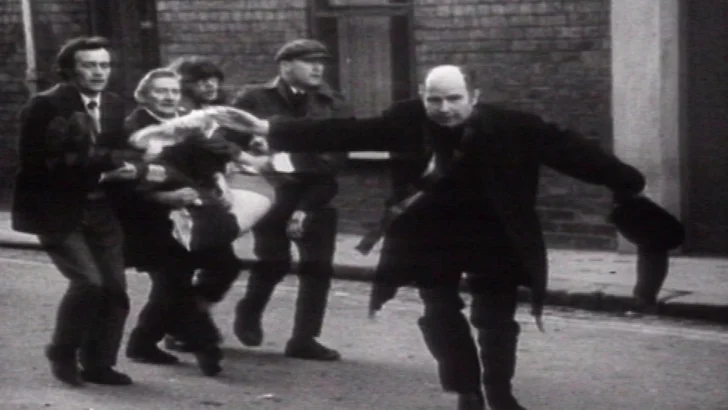There is a “grace-filled art in forgiving and remembering” the bishop of the Diocese of Derry has said on the 50th anniversary Mass of Remembrance for the victims of Bloody Sunday today.
In his homily, Bishop Donal McKeown said it takes “a wise heart to look at the rubble of what has been shattered in the past and to make it into a foundation for the future”.
“If all we do with the past is to use it as a heap of angry stones to throw at other people, then we cannot build. Either we process the rubbish of the past and make it into life-giving compost – or it lies in the corner and benefits no-one,” he said.
The bishop was speaking in St Mary’s Church in Creggan, Co. Derry on Friday (January 28), the same church in which the funerals of those who were killed on Bloody Sunday took place.
Twenty-six unarmed civilians were shot and fourteen were killed by British soldiers on January 30, 1972, during a protest march against internment in the Bogside area of Derry. Six of those who died were under the age of 18.
Bishop McKeown said that what happened 50 years ago “was such a shocking event that has reverberated down through the years and around the world. Unarmed civilians were gunned down by the state when all they were doing was protesting against decades of injustice”.
“There is no doubt now as to what we remember. The Saville tribunal overturned the Widgery whitewash, though it took 38 years for an acknowledgement of what the families always knew to be true. But though there are no doubts as to what happened, we can reflect on how we chose to remember what we recall with love,” he said.
Killed
When the “truth is killed to protect the system”, Bishop McKeown said, “the initial pain is multiplied”.
“As with many other tragedies in our history, the system frustrated the desire of families to get at the truth. Blatant lies were told. Campaigners were sometimes seen as obsessive. That put huge pressure on mental health and on relationships,” he said.
“People are crushed when institutions or organisations lie to preserve their reputation. We still have much truth to discover about many other deaths.”
The bishop said that those seeking to “stoke the flames of rage” promote a modern agenda, while others want to let “sleeping dogs lie” and not grapple with “uncomfortable truths that might disturb our comfort in the present”.
However, he said there is another way: “It seeks to acknowledge the past but to have compassion and forgiveness for those who were caught up in systems and situations that they can now look at with other eyes.”
Nourish
“I hope that our celebrations this weekend will help us all to build a future full of hope for our young people and not nourish them on bitter anger that can only kills and destroy. A new society on the island needs big hearts. It will not be created by small minds,” he said.
Bishop McKeown thanked Anglican Bishop Andrew Foster for his attendance, saying his presence “builds on the courageous work begun by Bishops Daly and Mehaffey some 40 years ago. They showed a way forward long before warring politicians would sit in the same room”.
He added: “Tonight, we remember those who died and those who were scarred by their deaths. But we also remember those who risked everything as they went to help the injured. Some are here tonight, and others died on that January afternoon.
“We remember heroism and strength of character in those who sought and fought for the truth. And, as people of faith, we remember that there is more grace and goodness in the world than sin and evil.
“And we pray that those whom we have loved can be at peace and that we can find peace at their leaving us.”


 Chai Brady
Chai Brady Fr Edward Daly waving a blood-stained white handkerchief on Bloody Sunday while trying to escourt mortally wounded Jackie Duddy to safety.
Fr Edward Daly waving a blood-stained white handkerchief on Bloody Sunday while trying to escourt mortally wounded Jackie Duddy to safety. 